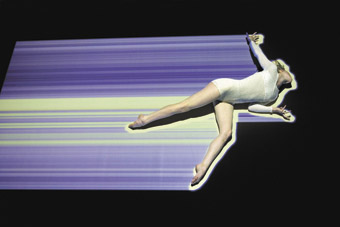glow: electric life @ PuSH Festival
andrew templeton

Kristy Ayre, glow, Chunky Move
Glow by Chunky Move explores of the most basic definition of physical existence: that we are simply organisms powered by electricity. Not unlike a television documentary, Glow follows the life cycle of an organism from emergence into an environment through to its death. The focus of this exploration is the energy that drives the organism and the impact this energy has on its environment.
The environment itself is simple: a glowing, white floor that the dancer moves across. Much of the work is floor-based and the key relationship is between the performer and the white space that darkens below us during the performance. Using a video tracking system developed by German computer artist Frieder Weiss, a form of digital landscape is created on the floor-screen that responds to the movements of the performer. These are not pre-programmed effects but rather respond in real time to the performer’s movements as choreographed by Gideon Obarzanek, director of Australia’s Chunky Move dance company.
For the most part, these are stripped down and stark lighting effects, dominated by white lines and shapes that move across the floor. When the performer first arrives, she crawls across the darkened floor like some an ancient, crab-like creature emerging from the seas. Her body is at the point where a horizontal and a vertical line intersect, giving a sense that the performer is somehow targeted in the scope of a sharp-shooter. On other occasions, the dancer’s body is outlined by a white line that the performer moves and shapes as if pushing from within an electric womb. In a particularly striking sequence, the performer lies in a foetal position, as if asleep, while white lines of varying thickness radiate from her body and race across the floor. It is as if we are seeing the energy seeping out of her into the environment. Although her body is at rest a sense of movement is created. This moment and others where an electric field is created around the performer’s body put me in mind of the aura that an electrically charged creature must give off.
The production is more than a light show and the sheer physical presence of the performer is vital. There are passages where she sensually crawls across the space, making eye contact with the audience and momentarily taking the experience out of the abstract where most of the production resides. These moments of focused attention on the performer’s body are accentuated by a decrease in the volume of the scoundscape and we are able to hear her movements on the floor. There are also moments where the performer vocalizes. While these are less successful, they do remind us of the organic, living creature that is, after all, the subject of this ‘documentary.’
By tracking the performer through light, we are able to see the impact her body has on time and space. There are sequences where the projections are delayed slightly, giving the impression that the floor is holding the memory of the dancer’s movements. This is used to greatest effect towards the end of the show, when the movements are held as black, organically rounded shapes. These shadows move of their own accord across the floor—the first time that the images take on a life of their own. Like strange cancers, the shapes move towards the performer who remains standing and perfectly still. The music builds, a touch melodramatically but effectively, and ends with a loud discordant sound as the shapes seem to re-enter the dancer’s body. The organism is entering the last cycle of life.
Glow ends with the dancer again lying on the floor with what looks like an electrical charge pulsing around her body. Although death is clearly implied, it is a strangely energetic moment. It is as if her energy were being released from her body back out into the universe—or more correctly being absorbed back into the ground where it originated. The dancer then stands in one corner of the space. In the centre of the floor, a grey dot flares, reminiscent of an old television being turned off, a lovely touch evoking an earlier form of technology while giving a sense of the life cycle ‘documentary’ coming to a close. Finally, a last charge of grey crosses the surface of the floor: the screen is dead, the energy gone.
–
Chunky Move, Glow, concept, choreography Gideon Obarzanek, performers Kristy Ayre, Sara Black, concept, interactive system design Fried Weiss, music & sound design Luke Smiles (motion laboratories), additional music Ben Frost, costume designer Paula Levis; Scotiabank Dance Centre, Vancouver, Jan 31-Feb 2; PuSh International Festival of Performing Arts, Jan 16 – Feb 3
Andrew Templeton is Vancouver-based writer and playwright who’s had plays produced in Vancouver and London.
© Andrew Templeton; for permission to reproduce apply to realtime@realtimearts.net






